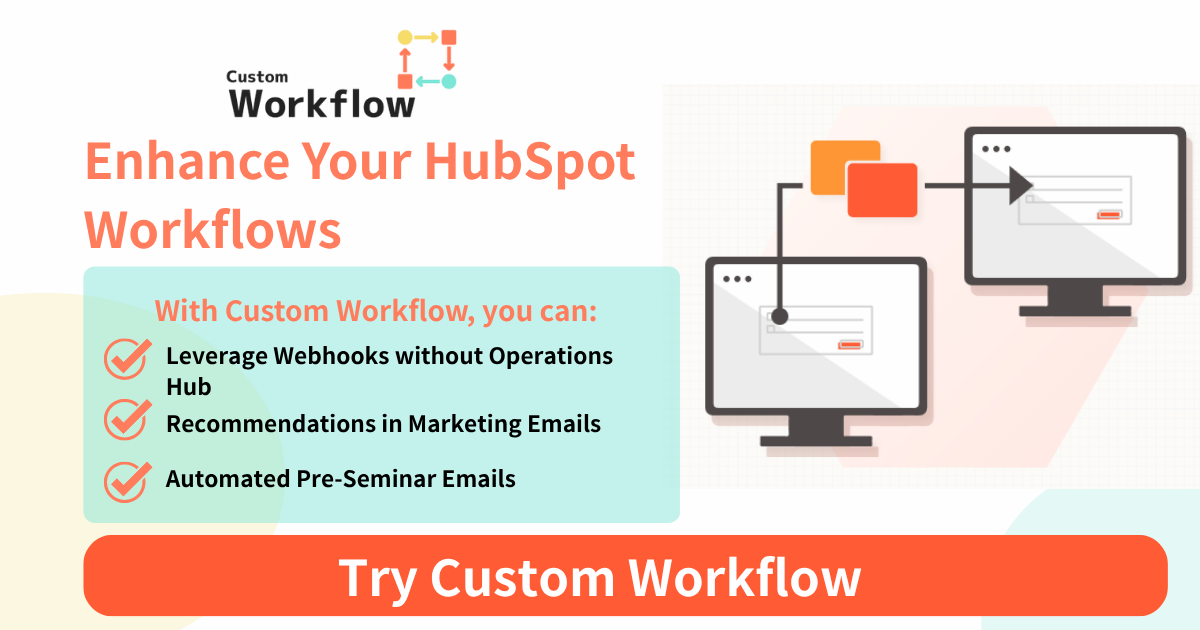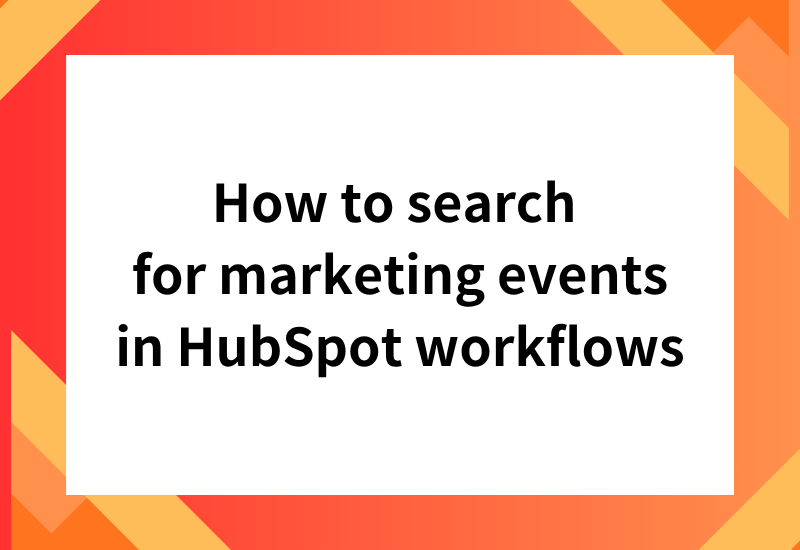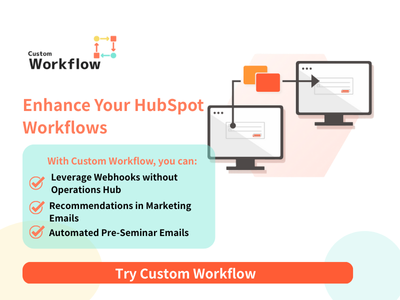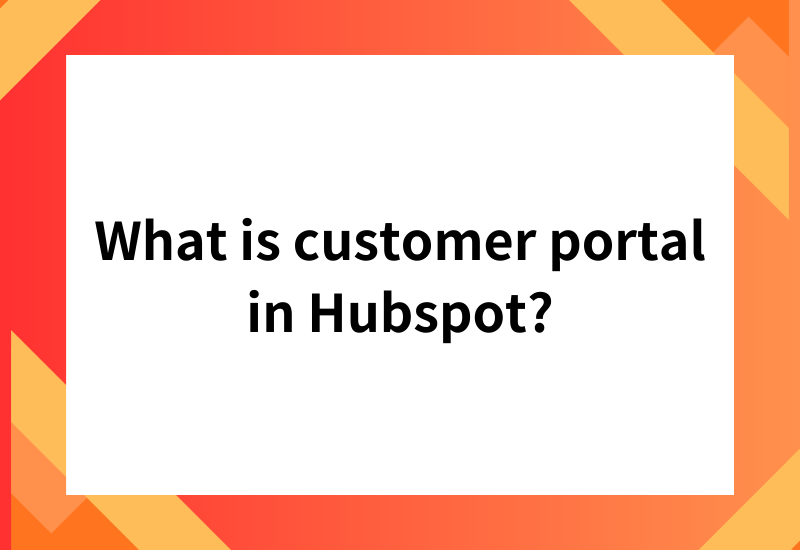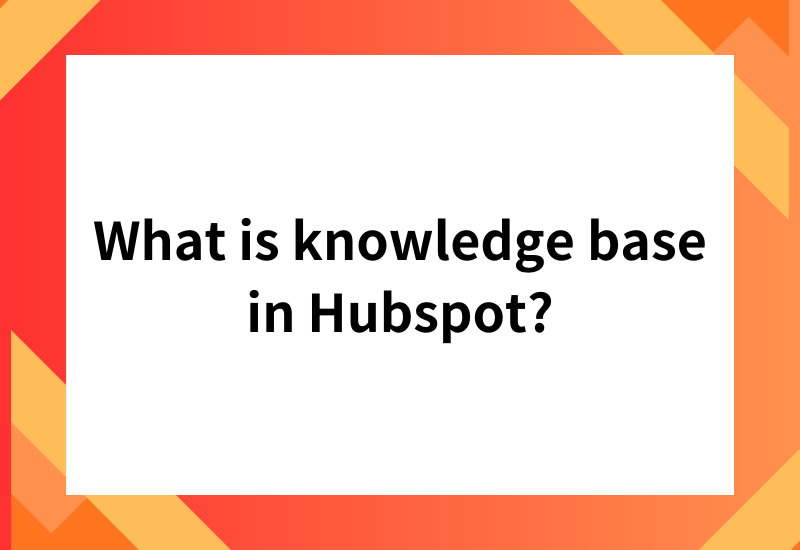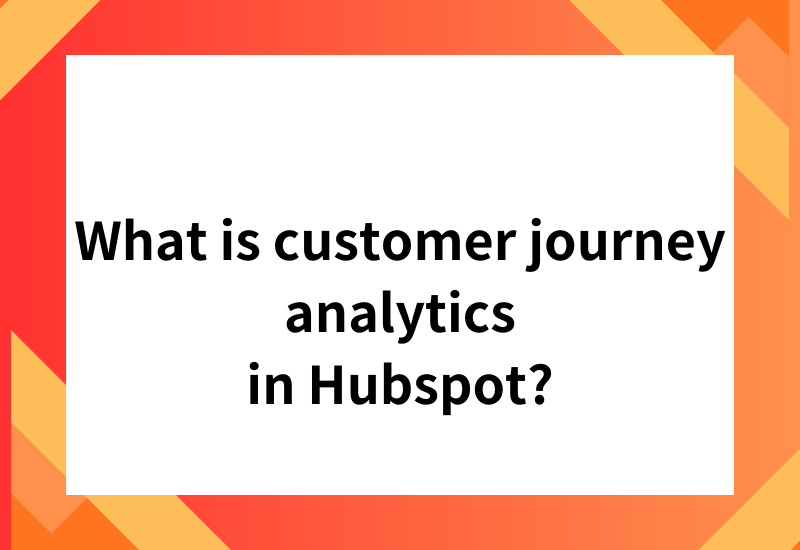Introduction
In B2B marketing, webinars, seminars, and online conferences have become the cornerstone of lead generation and nurturing. HubSpot provides the "Marketing Event" object to manage data for these events. When integrated with tools like Zoom or GoToWebinar, this feature is incredibly convenient as it automatically generates event data. Furthermore, HubSpot’s native event management features and official support are robust, supporting the efficiency of event operations.
With the "Marketing Event" object, you can input necessary information when creating an event, and use your HubSpot account to create new events, edit them, and analyze performance. The flow of creating events via API or UI is also fully supported.
However, many marketers who try to fully master HubSpot and maximize the efficiency of their webinar operations eventually hit a specific "wall."
That wall is: "The inability to dynamically find (lookup) a specific webinar (Marketing Event) within a workflow."
In particular, the inability to dynamically retrieve the "Zoom Event ID" when integrating with Zoom Webinars becomes a major bottleneck hindering automation.
Additionally, for attracting and announcing webinars or seminars, creating an event page on a website and posting a registration form is crucial.
In this article, we will dig deep into this challenge that cannot be solved with HubSpot's standard features. We will introduce and explain how to use a third-party app to "Search for Marketing Events," dramatically improving your automation level—including seamless Zoom integration.
HubSpot's "Marketing Event" object is a powerful feature that allows for centralized management of information for various marketing events, such as webinars and trade shows. Previously positioned primarily as a dedicated object for integrating with external webinar services, recent updates now allow for the direct import of event participant information. This enables the centralized management of participant data for not only online webinars but also trade shows and offline events directly within HubSpot.
Creating, editing, and updating event information is simple, allowing marketing managers to efficiently organize information for upcoming and past events. For example, you can import a list of trade show attendees to manage participant information for each event within HubSpot, or update participant information after an event ends to leverage it for future marketing initiatives. By utilizing HubSpot's marketing event features, you can achieve operational efficiency and centralized data management.
1. The "Things You Can't Originally Do" When Using HubSpot
First, let's clarify the limitations of standard HubSpot workflows.
Typically, HubSpot workflows operate using specific records like "Contacts" or "Companies" as triggers (starting points). Additionally, Marketing Events are managed as a type of CRM object in HubSpot, allowing for detailed management of information such as event dates, organizers, and event types via custom properties. For example, it is easy to send an email to a "contact who submitted a form."
Note: To manage events or perform specific operations in HubSpot, a HubSpot account and appropriate permissions are required.
However, the action of "searching the database for information on the webinar the contact wishes to attend (Lookup)" is impossible with standard features. Specifically, the following operations are not possible:
- No Standard Lookup Action: Standard workflows do not have an action to "automatically retrieve and process related event information." You are required to create the event and manually input and manage information such as the organizer, date, and event type.
- Manual Management Burden: While creating and editing event info is easy, you must create the event, register details like the organizer and date, and manage it efficiently. If you rely on standard features, this often leads to a need for manual association.
- Workflow Bloat: Without dynamic lookup, you are forced to modify workflows every time a new event is added. To manage events efficiently, it is necessary to create events and associate them with each contact or company, but doing this manually increases the operational load.
Unable to Dynamically Identify (Lookup) Events
For example, suppose a contact selects "October AI Seminar" in a form. When searching for an event, you would ideally utilize list information, contact IDs, or email addresses to efficiently identify the corresponding event.
While a human can easily understand, "Oh, it's this event," the standard workflow lacks an action to "Find the Marketing Event object named 'October AI Seminar' and retrieve its data."Note: When identifying events, utilizing contact information and static lists can facilitate offline event tracking and list association management, enabling more accurate event management.
Unable to Create Flexible Associations Based on Conditions
If you try to associate a registered contact with a specific marketing event using standard functions, you must create countless static branches (If/Then branches) in advance. By utilizing static lists and list associations, you can manage events efficiently, but the setup is rigid.
- If "Seminar A" → Add to Marketing Event A
- If "Seminar B" → Add to Marketing Event B
- If "Seminar C" → ...
This requires workflow modification every time an event is added, causing operational costs to balloon. In short, even though HubSpot holds both "Contact" and "Event Information" data, it lacks the "Search" function to bridge them automatically and dynamically.
2. Why Do Users Want to "Search for Marketing Events by Specific Conditions"?
Why is this "Search" function so critical for daily webinar and seminar operations? The ability to search and create marketing events is useful for managing both online and offline events, as well as centralizing offline event participation info. The reasons lie in "Scalability" and the "Zoom Event ID" dilemma.
Reason ①: Solving the Zoom Event ID "Manual Setting" Problem
This is the biggest pain point. When HubSpot and Zoom are integrated via the standard connector, you can use a workflow action to "Add contact to Zoom Webinar."
However, in that setting screen, you must manually select (fix) "which webinar to register for" from a dropdown menu.
This makes it impossible to build a flow that says, "Dynamically register to the Zoom webinar that matches the applied event." Behind the scenes, a Zoom Event ID (e.g., 999-888-777) is required, but standard features cannot handle this ID as a variable.
If "Event Search" is possible, you can retrieve the "Zoom Event ID" as a search result and pass it to an API or custom code. This allows for automatic processing with a single workflow, regardless of which webinar was applied for.
Reason ②: Reducing Event Operation Man-Hours
For companies holding multiple webinars monthly, creating a workflow for every single event is a tedious task.If you can automatically search using the "Event Name" as a key, you only need to create one generic workflow. Even if new events are added, you do not need to touch the workflow at all.
Reason ③: Reconciliation and Normalization with External Data (CSV, etc.)
Consider the case of importing a participant list (CSV) from an offline seminar or a joint event held with another company.The CSV usually contains the "Event Name" but not the HubSpot System ID. If the system can search and identify, "Oh, if it's this event name, it refers to this Marketing Event Object" during import, data association becomes completely automated.
3. Specific Use Cases
By using the "Marketing Event Search Action" introduced in the video, and by creating events to manage participation info, the following advanced automation becomes possible. In each use case, the person in charge creates and manages the event, and performs operations such as updating participant information and setting up distribution.
Case A: Fully Automated Zoom Webinar Registration (Using Zoom Event ID)
This is the most requested use case.
- Trigger: Contact selects a desired participation date in a form.
- Search Action: Search for the corresponding Marketing Event using the selected value as a key.
- Data Retrieval: Extract the hidden
eventExternalId(Zoom Event ID) from the search result JSON. - Registration Execution: Execute the Zoom Registration API (or custom code) using the retrieved ID.
- Result: Humans no longer need to look up and copy-paste IDs from Zoom.
Case B: Centralized Management of Pre-Event Reminder Emails
- Trigger: 1 day before the webinar.
- Action: Execute a search based on the event name and retrieve the event's "Start Date" and "Web Conference URL."
- Result: Embed the retrieved information as variables in the email and send. You no longer need to create separate email templates for every event.
Case C: Bulk Status Update for Past Seminars
- Trigger: After the event ends, import the participant list.
- Action: Execute a search based on the "Attended Event Name."
- Result: Bulk update the status of relevant contacts to "Attended" for the specific event found.
Customer Analysis
Leveraging marketing events also offers the significant benefit of allowing you to analyze participant behavior and attributes from multiple angles. For example, by aggregating data such as participant attributes for each event or participation rates in response to invitation emails, you can review what kind of marketing events were effective. This allows you to improve the accuracy of future event planning and targeting.
Furthermore, marketing events are extremely effective for Customer Journey Analysis. You can record each step—registration, attendance, cancellation—as an event, visualizing the history for each participant. For instance, if you specify the registration date and attendance date in an import file, you can automatically calculate the average time taken from event registration to attendance. This helps in deeply understanding participant behavioral trends and event outcomes, useful for improving the next event.
Analyze the Data
To maximize the effectiveness of marketing events, data analysis based on event and participant information is essential. HubSpot's marketing event feature allows you to import participant information for each event and centrally manage participant behavior and attributes. This makes it easy to grasp event results and participant trends.
Additionally, by utilizing customer journey analysis and attribution analysis, you can evaluate multi-dimensionally how much an event contributed to lead generation or deal creation. On the Contact Activity Timeline, the event participation date and time are displayed accurately, making the behavioral history of each participant clear at a glance. This aids in measuring the effectiveness of marketing measures and discovering improvement points for the next event. Utilize HubSpot's marketing event features to realize data-driven event operations.
4. So, How Can This Be Achieved?
This "Search" process, which is impossible with HubSpot's standard features, can be implemented surprisingly easily by introducing the appropriate extension app.
The solution we are introducing today is "Marketing Event Search Action" provided by Tech-Father.
As shown in the video demo, installing this app adds a new weapon called "Search Function" to your workflows.Usage is very simple:
- Add the Action:Place the "Marketing Event Search Action" within your workflow. By using this action, you can create marketing events and enable list association and event contact management.
- Set Search Conditions:Specify what to use as a clue for the search.
- Example:
Event Nameequals[Contact Property: Desired Event].
- Example:
- Data Output:This is the critical part. When the action is executed, the matching marketing event is found, and detailed JSON data is returned.Looking at the output result in the video (around 00:58), you can see that data like the following is retrieved:
eventDescription: Event DescriptionstartDateTime: Start Date and TimeeventExternalId: This is the ID required for linking with external tools like Zoom.
ID information that is normally "invisible" or "unusable" becomes data that you can freely handle within your workflow by passing it through this action.
How to search for marketing events in HubSpot workflows
5.We'll Build What You "Wanted to Do" — The Potential of a Development Request
The "Contact Search Action" we introduced is a powerful tool for expanding HubSpot's potential. However, every company's business process is unique. This action alone might not satisfy 100% of your specific needs.
"I don't want to search Contacts; I need to search Custom Objects.""I need to search data from our external database, not just HubSpot.""I need to not only search, but also process and aggregate the results with a specific logic and write them to another object."
You may be feeling the "limits of a packaged solution."
The "If It Doesn't Exist, Build It" Mindset
If the bottleneck in your marketing or operations is a specific "missing feature" in HubSpot, you have the option to fill that gap with custom development. This is where HubSpot's extensibility and flexible API truly shine.
Your daily manual tasks, your exports and imports to spreadsheets, your visual data checks... all of that inefficient work might be completely automatable by developing just one "Custom Workflow Action" built specifically for your company.
Please Consult With Us
- "I want to build this workflow, but I can't with standard features."
- "If only I could get that piece of data into my workflow, I could automate this whole process."
- "I want to automate this manual task, but the functions I need are missing."
If you're hitting a wall with your HubSpot operations, it's too early to give up.At Tech-Father, we specialize in developing the exact custom workflow actions that solve these "pain points." From general-purpose actions like the "Contact Search Action" to fully custom logic optimized for your unique business processes, we can provide a wide range of solutions.
Why not start by telling us what you've "always wanted to do"?We can propose the optimal solution to solve your challenge, whether it's a workaround with standard functions, utilizing an existing add-on, or building a completely custom solution from scratch.
The Power of Custom Development: Turning "Can't" into "Can" in HubSpot
The "Marketing Event Recommend Action" featured here is just one example of how HubSpot's capabilities can be extended.
The key takeaway is this: you don't have to give up just because a standard HubSpot feature is missing. The option to "achieve it with custom development" exists.
- "I want to create a bi-directional data sync between my internal system and HubSpot."
- "I need to run complex, proprietary calculations (like a custom lead score) inside a workflow."
- "I must integrate with our niche industry SaaS via API and write data back to contact properties."
HubSpot has an open API and is extremely flexible for customization. However, unlocking its full potential requires specialized development skills and a deep understanding of both the HubSpot platform and its API.
If you are using HubSpot and find yourself thinking, "If only I had this one feature, my operations would improve dramatically," or "If only I could connect this system, our data utilization would be next-level," you don't have to give up on "if only."
Why not discuss your development request with a specialist who can turn that "can't" into "can"?
The action introduced today was developed by Tech-Father Inc., a company specializing in exactly this kind of HubSpot customization.
They provide solutions that address those specific "pain points" in HubSpot, from custom workflow action development to external system API integrations.
